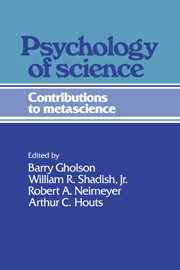Book contents
- Frontmatter
- Contents
- Preface
- Contributors
- 1 The psychology of science: An introduction
- Part I Historical issues in the psychology of science
- Part II The case for a psychology of science
- 4 The reflexivity problem in the psychology of science
- 5 Uneasy chapters in the relationship between psychology and epistemology
- 6 Participatory epistemology and psychology of science
- Part III Creativity and the psychology of science
- Part IV Cognition in the psychology of science
- Part V Social factors in the psychology of science
- Part VI Epilogue and Prologue
- Author index
- Subject index
5 - Uneasy chapters in the relationship between psychology and epistemology
Published online by Cambridge University Press: 05 June 2012
- Frontmatter
- Contents
- Preface
- Contributors
- 1 The psychology of science: An introduction
- Part I Historical issues in the psychology of science
- Part II The case for a psychology of science
- 4 The reflexivity problem in the psychology of science
- 5 Uneasy chapters in the relationship between psychology and epistemology
- 6 Participatory epistemology and psychology of science
- Part III Creativity and the psychology of science
- Part IV Cognition in the psychology of science
- Part V Social factors in the psychology of science
- Part VI Epilogue and Prologue
- Author index
- Subject index
Summary
In recent years it has become common for some philosophers interested in the problems of ordinary and scientific knowing to identify themselves as “naturalistic” epistemologists. At minimum, this characterization indicates that the bearers consider themselves to be taking science, and particularly the science of psychology, very seriously – to be using empirical observations as an integral part of their attempt to fulfill epistemology's traditional ambition to explain what knowledge is, how we come by it, and how it can be distinguished from its pretenders. Major difficulties attend any attempt to give a more detailed and general account than this, as to what distinguishes naturalistic epistemologists from their fellow, nonnaturalistic, philosophers of knowledge. Nelson (1984) expresses the problem:
At the heart of naturalization is the idea that the theoretical entities of philosophy be restricted to those explicitly needed in natural science.… The restriction to entities ‘needed in science’ is not really a restriction to anything very clear: allowable are sets, numbers, physical bodies, and spatio-temporal coordinate systems; but any general characterization is impossible without begging philosophical questions.… Such clarity as the idea of naturalization has will have to remain on an inexact, intuitive basis until we get down to cases, (p. 174)
In begging philosophical questions, a general definition of naturalism would also run roughshod over differences of opinion among naturalistic epistemologists regarding the distinguishing features of their scholarship.
- Type
- Chapter
- Information
- Psychology of ScienceContributions to Metascience, pp. 115 - 137Publisher: Cambridge University PressPrint publication year: 1989
- 5
- Cited by



